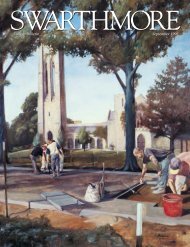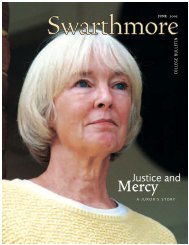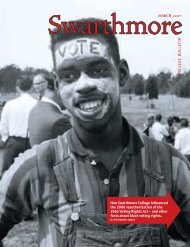Recent Books by AlumniWe welcome review copies ofbooks by alumni. The booksare donated to the <strong>Swarthmore</strong>anasection of McCabeLibrary after they have beennoted for this column.May T. Miller and SusanButts Burton ’84, A Batch ofPatchwork, American Quilter’sSociety, 1997. In additionto instructions for 12quilts, this book containstips and instructions onchoosing fabrics, cutting,stitching, pressing, borders,backing, binding, tying, andquilting.Jill (Morrel) Coleman ’52,WaterYoga: Water-AssistedPostures and Stretches forFlexibility and Well-Being,Eglantine Press, <strong>1998</strong>.Designed for anyone who hasto cope with back problemsor arthritis, this guideexplores combining the art ofyoga and the use of warmwater to increase flexibilitythrough stretches and gentlemovements.Alzina Stone Dale ’52, MysteryReader’s Walking Guide:Washington, D.C., PassportBooks, <strong>1998</strong>. This guide giveseight walking tours of thecapital’s neighborhoods asthey are described by morethan 200 mystery writers.Each walk is accompanied bya map of the route as well asrecommended restaurantsand places of interest alongthe way.Joshua Gamson ’85, FreaksTalk Back: Tabloid TalkShows and Sexual Nonconformity,University of ChicagoPress, <strong>1998</strong>. Taking the criticismthat talk shows turneverything they touch into“freak shows” as a startingpoint, Gamson asks whathappens when the so-calledfreaks talk back, exploitingthe media system thatexploits them.Frank E. Vogel and Samuel L.Hayes III ’57, Islamic Law andFinance: Religion, Risk, andReturn, Kluwer Law International,<strong>1998</strong>. This bookdescribes the field of Islamicbanking and finance as practicedin the modern era andlooks at this unique form ofcommerce over the past 20years as wealth in the MiddleEast and parts of Asia hasexpanded.Stephen Henighan ’84, ThePlaces Where Names Vanish,Thistledown Press, <strong>1998</strong>.This novel tells the story ofMarta, who escapes the grimlife of her village in Ecuadorto endure only poverty,humiliation, and abandonmentin the linguisticallydivided society of Montreal.Dana Lyons ’82, Cows withGuns, Penguin Studio, <strong>1998</strong>.This book (with accompanyingmusical CD) tells the taleof cow guru Cow Tse-Tongueand his bovine followers,who take on America’s meateatingpopulation.Richard Martin ’67, AmericanIngenuity: Sportswear1930s–1970s, MetropolitanMuseum of Art, <strong>1998</strong>. Publishedin conjunction with anexhibition at the MetropolitanMuseum of Art, whichruns through August 16, thiscatalog showcases designerswho were “the pioneers ofgender equity in their useful,adaptable clothing.”Ellen (MacDonald) Mutari’78, Heather Boushey, andWilliam Fraher IV, Genderand Political Economy: IncorporatingDiversity into Theoryand Policy, M.E. Sharpe, 1997.This collection of articlesextends the boundaries ofpolitical economy by exploringthe theoretical and policyimplications of incorporatingdiversity into economic theoryand public policy.Pamela Miller Ness ’72, pinklight, sleeping, Small PoetryPress, <strong>1998</strong>. This limited editionchapbook of poetry elicitsvisions of seasons and thecolors they evoke. Copiesmay be ordered from theauthor, 33 Riverside Drive,Apartment 4-G, New York NY10023 ($6 postpaid).Martha M. (Merrill) Pickrell’60, Dr. Miles, Guild Press ofIndiana, 1997. The founder ofthe Dr. Miles Medical Company(now Bayer), FranklinMiles was a physicianentrepreneurwho developednonprescription remedies tolessen stress. This biographytells the story of a manwhose interests ran frommedicine to innovative projectsin agriculture.Don Scarborough ’62 andSaul Sternberg ’54, Methods,Models, and ConceptualIssues, MIT Press, <strong>1998</strong>.Focusing on conceptualissues and methods, this volumeincludes work in artificialintelligence, neural networkmodels, animal cognition,signal-detection theory,computational models, reaction-timemethods, and cognitiveneuroscience.Peter A. Selwyn ’76, Survivingthe Fall, Yale UniversityPress, <strong>1998</strong>. One of the firstAIDS doctors, Selwyn detailshis initial feelings of helplessnessas he watched hispatients die and how thisforced him to care for hispatients in a different way—to witness and relieve theirsuffering and to learn how toaccompany them throughtheir illness.Mary McDermott Shideler’38, The Years of Confusion:Stage II in the Series Visionsand Nightmares, Ends andBeginnings, A Woman’s LifelongJourney, Scribendi Press,1997. The second in a fivepartseries of books abouther life, Shideler interweavesher outer and inner experiencesof marriage and exposuresto cultures radicallydifferent from her upbringing,from the year of hergraduation to 1954.Simon St. Laurent ’92, XML:A Primer, MIS:Press, <strong>1998</strong>.This guide is for Web developerson the use of a newtechnology that promises toreplace HTML, giving themincreased power and flexibilitynot before possible.Dynamic HTML: A Primer,MIS:Press, 1997. A newscripting language for Webdevelopers, dynamic HTMLwill provide them with theability to create “deep” Webpages capable of respondinginstantaneously to a user’sactions. Cookies, McGraw-Hill, <strong>1998</strong>. This guide givesthe full picture of how cookiesfit into the Web toolkitand how they work withother tools. St. Laurentexplores the truth aboutcookies’ power to invade privacy,spread viruses, andbreach security.Anne C. (Christian) Tedeschi’56, Book Displays: A LibraryExhibits Handbook, HighsmithPress, 1997. Written forsmall- and medium-sizeschool, public, academiclibraries and museums, thishandbook offers the fundamentalguidance to improvingexhibits and avoidingdamage to display copies.Maochun Yu ’87, OSS inChina: Prelude to Cold War,Yale University Press, 1996.Drawing from recentlydeclassified materials fromthe U.S. National Archivesand on previously secret Chinesedocuments, Yu tells thedramatic story of the intelligenceactivities of the Officeof Strategic Services in Chinaduring World War II.58 SWARTHMORE COLLEGE BULLETIN
O U R B A C K P A G E SWhat Lucretia MottMeans to MeBy Jamie Stiehm ’82Lucretia and I go back 15 years, tothe day in 1983 I decided to writemy senior history thesis on theQuaker whose blue eyes sparkledfrom beneath a bonnet in the portraitthat once graced Parrish Parlors.Worthy Lucretia Mott was elevatedto her rightful place in thepantheon of U.S. history in<strong>June</strong> 1997, when a statuedepicting her and two otherwomen’srights leaders, ElizabethCady Stanton and SusanB. Anthony, was dedicated inthe Capitol rotunda. The threeknew each other; Mott representsthe start of the suffragettestory, Stanton themiddle, and Anthony—well,the beginning of the end.At the dedication a chorusof schoolgirls sang while lightstreamed through the Capitoldome, which Sen. Olympia J.Snowe of Maine called “theepicenter of American democracy.”Snowe said, “Whatadorns the rotunda matters”and expressed the hope thatother heroines of history,such as Sojourner Truth,would not be far behind.Maryland CongresswomanConstance Morella, who ledthe Promethean battle tobring the statue upstairs afterCongress had let it languish inthe dark crypt of the Capitolfor 76 years, opened herspeech by saying, “Welcomehome!” to the three women.It’s worth noting that twoof the three, Mott and Anthony,were Quakers. Also notable is thatnot one of them lived to see the daythat women would vote, notwithstandingAnthony’s last words spokenin public before her death in 1906:“Failure is impossible!” Mott died in1880, four decades before womenwere enfranchised in 1920, the causeshe championed the last 30 years ofher life.Better late than never that this allaroundsocial do-gooder, who byrights should be a heroine to Americanschoolgirls, is finally in the sameroom as George Washington andAbraham Lincoln. One can only guessat the conversations that their ghostscould hold in the dark, after the lightsgo off.Where would we all be without theunwavering vision of this extraordinarywoman who became a Quakerminister in Philadelphia at age 28?Lucretia Mottwas neverexposed to thesocial myththat portrayedwomen as helpless,fragile beings.(This was not unusual for a woman inthe Religious Society of Friends, but itwas a rare distinction for someone soyoung.) Married to a merchant and amother of two at the time, by 1821 shehad already emerged as a gifted publicspeaker on the burning socialissues of the day.Let me tell you about Lucretia andwhat she means to me. She was bornon Nantucket, an isolated whalingisland where most of the men wereaway for years at a time on their voyages.That left women to takecare of the day-to-day businessnot just of households but theentire island economy. So faraway from the mainland didlargely Quaker Nantucketseem that it stayed neutralduring the Revolutionary War.Nantucket women had noother choice but to be sturdyand self-reliant in the bestAmerican sense of the word.As a Quaker girl born in 1793,Lucretia Coffin was neverexposed to the social myththat portrayed women as helpless,fragile beings. Moreover,women’s weighty responsibilitiesfostered a sense of camaraderieamong them.It was on Nantucket that herdeep-rooted Quaker conceptionof absolute human equalitywas planted, ideas that laterinspired her activism in theabolitionist and women’srights movements. She drewno distinction between blackand white, male and female,and did not put one causebefore the other.Some historians have writtenof the suffragette movementas an afterthought or offshootof abolitionism. Mottshows us otherwise. For herthe two were one, all of a piece, andboth sprang from her Quaker andEnlightenment beliefs in universalequality.Abolitionism, if anything, showedhow unenlightened the world waswhen it came to women. During theWorld Anti-Slavery Convention in Londonin 1840, Mott as a female delegatewas barred from speaking or voting.FRIENDS HISTORICAL LIBRARY OF SWARTHMORE COLLEGE64 SWARTHMORE COLLEGE BULLETIN
















